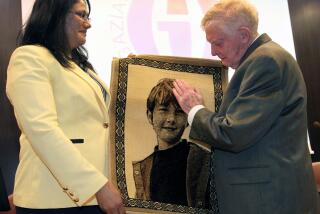Infant Organ-Harvesting Plan at UCSF Thrown Into Limbo
A 32-year-old Ohio woman delivered a stillborn anencephalic boy at UC San Francisco Medical Center on Tuesday afternoon, throwing into limbo the medical center’s secrecy-shrouded plans to harvest organs from brain-defective infants.
A team of physicians led by pioneering fetal surgeon Dr. Michael R. Harrison and Dr. Mitchell Golbus, an obstetrician, had hoped to follow the lead of Loma Linda University Medical Center in establishing a controversial organ-donation program for babies born without parts of the brain and skull. So far, Loma Linda’s organ-harvesting efforts from such anencephalic infants have been unsuccessful in seven cases.
The Ohio parents, who asked not to be identified, flew to San Francisco over the weekend after deciding to donate their child’s major organs. But their hopes were dashed when the fetus died hours after his mother, who has three other children, went into labor. Despite good obstetrical care, 50% to 60% of anencephalics are stillborn.
“The parents were highly motivated to make this pregnancy into something positive for some other life,” Golbus said in a telephone interview. “(But) labor is a difficult process and the fetus who is not intact doesn’t seem to withstand it very well.”
Had the child been born alive, UCSF physicians had planned to follow Loma Linda’s guidelines that call for sustaining the infant on a respirator for up to seven days. If the child had been declared brain dead while the heart, liver and kidneys remained free of damage, these organs might have been used in transplant surgery.
The Loma Linda program has been controversial because the anencephalics are kept alive not for their own benefit, but in the hope of providing benefit to others. In addition, medical experts are uncertain whether brain death can be diagnosed during the first week of life.
UCSF officials said Tuesday that the stillbirth will force them to review their decision to harvest anencephalic organ donors, which has been the subject of extensive behind-the-scenes debate at the medical center for several years. Several other potential donors, including one from Canada, have also been considered in recent months, but have failed to materialize for a variety of reasons.
To Reassess Plan
” . . . Our immediate plan is to sit down in light of our experience and look it over again,” said Dr. William Hamilton, the medical school vice dean who chairs the university’s committee on the subject.
One prominent bioethicist with reservations about the decision is former UCSF faculty member Albert R. Jonsen, who chaired the institution’s anencephaly advisory committee through July, 1987, and “was negative” about several earlier proposals from Harrison to go forward.
“I think there ought to be some fairly broad (national) consensus,” Jonsen said in a telephone interview from Seattle, where he is now chairman of the Department of Medical History and Bioethics at the University of Washington. “I happen to think that the Loma Linda procedure meets standards for ethical practice . . . but I don’t think centers ought to just go ahead. There are clearly divided opinions about what ought to be done.”
More to Read
Sign up for Essential California
The most important California stories and recommendations in your inbox every morning.
You may occasionally receive promotional content from the Los Angeles Times.










